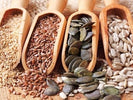
ADDING HEALTHY SEEDS TO YOUR DAILY DIET FOR OPTIMAL HEALTH
- by Shiv Kumar Singh
- 5 min reading time
Incorporating healthy seeds into your daily diet is a simple and effective way to boost your overall health and well-being. These tiny powerhouses are packed with essential nutrients, including protein, fibre, and healthy fats, making them a valuable addition to any meal or snack.
Discover simple and creative ways to incorporate nutritious chia seeds into your daily meals with these quick and easy recipes. Join us as we explore delicious ways to enjoy this superfood and elevate your healthy eating habits.
Here are some of the top seeds to consider adding to your diet for optimal health:
- Chia Seeds - These small but mighty seeds are rich in omega-3 fatty acids, fibre, and antioxidants. They can help improve digestion, promote heart health, and keep you feeling full and satisfied. Furthermore, chia seeds are packed with essential vitamins, minerals, and antioxidants, enhancing overall nutritional intake. Their versatility allows for effortless integration into your daily diet, offering a myriad of creative and nutritious possibilities.
- Flaxseeds - Flaxseeds are high in fibre and lignans, which have been shown to reduce inflammation and lower cholesterol levels. They are also a good source of omega-3 fatty acids, making them a great choice for supporting brain health. Studies consistently demonstrate the cardiovascular benefits of flaxseeds, making them a valuable addition to your meals. Ensure you incorporate flax seeds into your diet to promote heart health and overall well-being.
- Pumpkin Seeds - Pumpkin seeds are a good source of magnesium, iron, zinc, and protein. They can help support immune function, promote healthy skin and hair, and aid in muscle recovery after exercise. The compounds found in pumpkin seeds are renowned for their health benefits, potentially aiding in managing diabetes, alleviating depression, inhibiting tumour growth, and acting as potent antioxidants.
- Sunflower Seeds - Sunflower seeds are rich in vitamin E, an antioxidant that helps protect cells from damage. They also contain healthy fats and protein, making them a nutritious addition to your diet. Whether enjoyed as a snack or added to salads, cereals, or baked goods, sunflower seeds are a nutritious and tasty choice for any meal. Packed with protein, sunflower seeds offer 4.6 grams of protein in just a 20-gram handful, making them an excellent source of this essential nutrient for your diet.
- Hemp Seeds - Hemp seeds are a complete protein source, meaning they provide all nine essential amino acids that the body cannot produce on its own. They are also a good source of omega-3 and omega-6 fatty acids, which can help reduce inflammation and support heart health. Hemp seeds boast a protein content comparable to or even surpassing that of other nuts, making them an excellent plant-based protein source. Additionally, research suggests that hemp seeds may alleviate skin dryness and itchiness in individuals with dermatitis, highlighting their potential as a holistic remedy for skin health.
- Basil Seeds: Basil seeds, often enjoyed in faloodas, are rich in protein and contain essential amino acids, offering numerous health benefits. Their consumption is associated with lowering the risk of type-2 diabetes and supporting heart health, while also possessing antiulcer and antimicrobial properties. Basil seeds promote digestive health, enhance skin appearance, and alleviate stress. Additionally, they may aid in weight loss, making them a valuable addition to a healthy diet.
- Sesame Seeds: Sesame seeds, commonly used in making tilladdoos, are among the top seeds for consumption. They contain sesamin and sesamolin, unique substances with cholesterol-lowering and potentially blood pressure-regulating properties. Moreover, sesame seeds exhibit antibacterial qualities, making them effective in treating skin conditions like athlete’s foot fungus.
What Nutrients Can you get from Seeds
- Fibre:Seeds are rich in dietary fibre, which plays a crucial role in preventing various ailments. Fibre promotes satiety, helping you feel fuller for longer, and acts as prebiotics, nourishing beneficial bacteria in the gut.
- Protein:Seeds are packed with essential amino acids, which are vital for our body as they cannot be produced internally and must be obtained through diet. These amino acids serve as the fundamental building blocks for proteins, necessary for growth and maintenance of bodily functions.
- Healthy Fats:Seeds are rich in essential fatty acids, such as omega-3 and omega-6, which play crucial roles in nutrition. Omega-3 fatty acids, in particular, are essential for cellular functions, maintaining cell structure, regulating the nervous system, and possessing anti-inflammatory properties.
- Calcium:Some seeds, like gingelly and flaxseed, are good sources of calcium, an important mineral for maintaining strong bones and teeth.
- Trace minerals:Seeds contain trace minerals like manganese and selenium, which offer various health benefits.
- Vitamin E:Seeds are rich in vitamin E, acting as powerful antioxidants and bolstering immunity.
By incorporating a variety of healthy seeds into your daily meals and snacks, you can reap the many benefits they have to offer. Whether sprinkled on top of yoghurt, blended into smoothies, or added to salads and oatmeal, these nutrient-dense seeds are an easy and delicious way to enhance your diet and optimise your health. So, go ahead and start experimenting with different types of seeds to discover which ones work best for you and your taste preferences. Your body will thank you for it!



